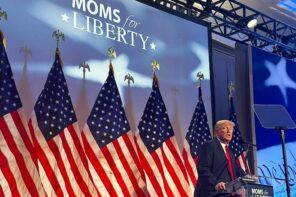This has been the summer of discontent with David Barton. First, in a poll taken by History News Network, Barton’s newest work, The Jefferson Lies, topped the list of “least credible history works in print.” The same work met a unanimous chorus of refutations from Jefferson public humanities scholar and radio personality Clay Jenkinson, from religious historians ranging from Martin Marty to John Fea, and (in the full length work Getting Jefferson Right) from Grove City College professors Warren Throckmorton and Michael Coulter.
Barton himself ascribes the motivations of his critics to either jealousy (because his books sell so well, especially in the homeschooler market), or “liberalism,” a term that evidently takes in everyone who dares take issue with him, from evangelical historians to “deconstructionists.”
I weighed in here on Barton both last year and more recently here—in the latter, expressing my skepticism of whether refutations would have any effect on someone whose work was basically part of an entrepreneurial rather than a scholarly enterprise.
On that latter point, it appears (to my delight) that I was wrong, at least in part. The tide has turned, evidently, because of a pileup of criticisms from within Barton’s own cocoon.
Most recently, conservative scholars have begun to pile on. Thomas Kidd, the well-respected Baylor historian known for his excellent works in early American history as well as his contributions to conservative intellectual periodicals, reported in World Magazine (“Today’s News, Christian Views”) on a growing chorus from conservative evangelicals and Catholics who agreed generally with Barton’s emphasis on the importance of religion in the founding, but felt that Barton’s work, both in books as well as in his widely used video series, was replete with “embarrassing factual errors, suspiciously selective quotes, and highly misleading claims.”
Then, in “David Barton’s Errors,” Greg Forster, a scholar of John Locke and religion, went through Barton’s references to Locke’s supposed support for conservative Christian faith, and found that Barton’s “inability to write reliable history stretches beyond ideological cheerleading into outright incompetence.” His piece details those errors to devastating effect, and this from an author who previously wrote another essay on how Locke had led him to his Christian faith. Perhaps most importantly, Grove City college professors Warren Throckmorton and Michael Coulter sliced and diced their way through The Jefferson Lies, leaving little but pulp at the bottom of their scholarly veg-o-matic.
Thomas Nelson, publisher of David Barton’s The Jefferson Lies and a substantial catalog of Christian works (some serious and respectable, some amusingly kitschy such as The Patriot’s Bible, an “extremely unique Bible” that illustrates biblical verses with inspiring scenes from American history), finally has had enough.
On Thursday, the publisher announced that it would pull from publication The Jefferson Lies. “In the course of our review,” the publisher said that it had “learned that there were some historical details included in the book that were not adequately supported,” and that “because of these deficiencies” it was “in the best interest of our readers to stop the publication and distribution” of the work.
One can only hope they might consider doing the same with some of their other publications of dubious historicity, including John Perry’s absurd Bartonesque hagiography of Robert E. Lee, which describes the Confederate general as a “virtuous warrior who endured withering opposition and sacrificed all to stand for Constitutional freedoms.”
While the conservative scholars piled on in defense of historical truth and accuracy, the mainstream media outlets have taken the “fair and balanced” approach on discussing the “controversial” historian Barton. The New York Times followed the usual tack in its story from May, noting that “many historians call his research flawed, but Mr. Barton’s influence appears to be greater than ever,” and adding that “liberal organizations” were raising the alarm “over what they say are Barton’s dangerous distortions.” In short, Barton’s history came down to some version of the usual liberal-conservative debate, like competing campaign speeches, and we just line up on our usual sides accordingly.
Barbara Bradley Hagerty’s story for All Things Considered, which aired on Wednesday, typified this approach in both its stronger elements (more evidence in the print version than on radio) as well as in its more frustrating points.
The story quoted Barton at length and correctly noted the extent of his political influence, and then gently corrected him on a couple of his howlers. My favorite: the constitutional requirement for the president to be native-born, Barton says, comes “verbatim” from Deuteronomy 17:15—a verse which reads, in the New International Version, “be sure to appoint over you a king the Lord your God chooses. He must be from among your fellow Israelites. Do not place a foreigner over you, one who is not an Israelite.” To Barton, this Old Testament-derived requirement to show the birth certificate “drives the secularists nuts because the Bible’s all over it! Now we as Christians don’t tend to recognize that. We think [the Constitution is] a secular document; we’ve bought into their lies. It’s not.”
The radio piece continues in the customary fair and balanced point-counterpoint style: Barton’s views (at length), a correction or two, a sentence or two from his critics, a sentence or two from a defender, more from Barton’s plans (including taking over the history curriculum of the state of Texas), end of story. Barton is a “controversial” historian, not a “discredited” one, and the hearer/reader has the impression that the history he presents is unpopular among many and probably suspect, but somehow open to debate. Barton talks at length; the legitimate scholars get a sentence or two of a sound-byte cut from longer interviews.
To put it somewhat crudely, the logic of these pieces goes something like this:
Controversial scientist Barton says the earth is flat. We checked a couple of specific references he has made, and it turns out they aren’t correct. And a lot of others in his field disagree. Yet here is Professor Smith from Flat Earth University, who says Barton is right and could knock out all other scientists in a debate. And Barton defends himself by pointing to the 10,000 documents he has collected which show that the earth indeed is flat. Those sympathetic to Barton’s religious views have decried what they see as the political agenda behind his espousal of the flat earth theory, but Barton dismisses them as part of a liberal establishment which defames religion.
And back and forth like that.
We can be thankful for the Christian and conservative scholars, especially the irrepressible Barton-slayer Warren Throckmorton, who have called out Barton’s partisan pseudo-history, and at the same time more closely examine how and why the drumbeat of conservative criticism on “the mainstream media” left them partially unable to address directly the fraudulent nature of Barton’s enterprise.
And the extent to which Barton’s now exposed pseudo-history will affect his political influence remains an open question. In the Nashville Tennessean, a disappointed Barton fan who hoped to see him at a 9/12 rally, and who had The Jefferson Lies on an audio CD, admitted that “the book wasn’t as good as some of his other previous works,” but hoped that “the current controversy won’t undermine his credibility. ‘It’s bad because it’s not typical of him,’ she said. ‘He’s usually so rock solid on history.’”
Thus, neither Thomas Nelson’s actions nor the growing chorus of criticisms and refutations will drive a stake through the heart of WallBuilders. It’s too deeply entrenched within its world, too well connected politically, and too useful in the project of political mobilization. Barton’s partisans and admirers have enthusiasms that will survive this setback. Their project of both reclaiming a Christian America from an imagined past and building a Christian America from the pagan present will survive the slings and arrows of Barton’s current outrageous misfortune.
And yet, perhaps the summer of Barton’s discontent suggests a cresting of his influence, and the ability of legitimate writers and scholars of various political persuasions to come together in defense of basic norms of reason and credibility in a way that seems increasingly impossible in the political realm.




